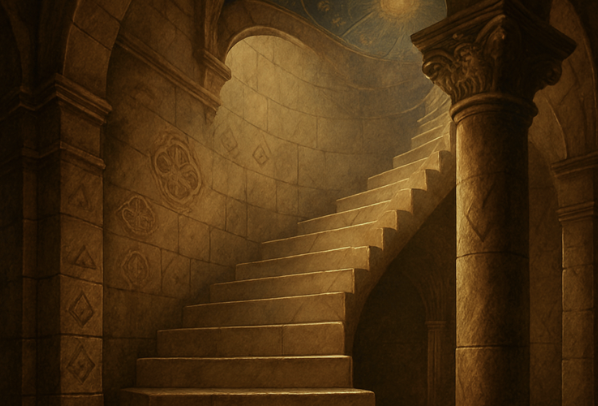

Reflective Commentary (2025)
The brief essay ‘Classic Philology: A Definition’ was composed in 2014 during my doctoral programme, as part of the course Introduction to Humane Letters. Now, a decade later, I return to the text for the first time since its drafting. In this review, my primary concern has been the lack of precision in defining key concepts and integrating them coherently into the larger thesis of the essay. In this spirit, I have revised the content to enhance historical accuracy, conceptual clarity, and terminological precision. All of this is situated within the tradition of classical philology and the liberal arts. Updates address ambiguities about technical terms (such as “textus receptus”), clarifies distinctions between classical and modern philology, and provides a more nuanced account of shifting attitudes toward philological inquiry in the Western tradition. The revisions also place key historical figures, such as Jerome and Valla, within the broader context of rigorous critical scholarship. Overall, these editorial changes seek to ensure that the intellectual and historical contexts are represented for the reader with the greatest possible clarity and accuracy.
Classical Philology: Its Role within the Canon of Classical Learning (Revised from the original draft in 2014)
Classical philology is the scholarly study and interpretation of the languages and literature of ancient Greece and Rome, as found in a broad array of literary and non-literary texts, with the aim of understanding their linguistic, historical, and cultural contexts. Although brief, the scope encompasses a rigorous analysis of the historical development of ideas, engaging deeply with the Trivium, particularly grammar and rhetoric, foundational disciplines for interpreting classical texts. While classical philology may occasionally draw upon areas of the Quadrivium, its primary focus remains the mastery and critical examination of language, literature, and the intellectual context of antiquity, the Greeks and Romans.
Collectively, the seven liberal arts of the Trivium and Quadrivium form the foundation, the traditional canon, of classical learning. Within this milieu, classical philology is the scholarly discipline that examines the texts, languages, and intellectual legacy of antiquity, transmitted in Greek and Latin. Classical philology primarily focuses on works composed in these ancient languages. However, the broader field of philology today is more inclusive, encompassing the study of texts and linguistic traditions from various cultures and periods, thus extending beyond the scope of the Trivium and Quadrivium.
The Trivium and Quadrivium: Pillars of the Liberal Arts Curriculum
The seven liberal arts of classical education are traditionally divided into the Trivium and the Quadrivium, a progressing sequence that moves from foundational skills to more advanced studies.
The Trivium, which focuses on language and reasoning, begins with grammar, logic, and rhetoric (see Table 1).
| Branch | Discipline | Description |
|---|---|---|
| Trivium | Grammar | The essential art of reading, writing, and understanding language. |
| Trivium | Logic (Dialectic) | Develops the ability to reason, analyse arguments, and think critically. |
| Trivium | Rhetoric | Teaches the effective and persuasive communication of ideas. |
Building upon these linguistic and intellectual skills, the Quadrivium introduces the mathematical disciplines, starting with arithmetic, geometry, music, and astronomy (see Table 2).
| Branch | Discipline | Description |
|---|---|---|
| Quadrivium | Arithmetic | The study of numbers and their properties. |
| Quadrivium | Geometry | Explores shapes, sizes, and the properties of space. |
| Quadrivium | Music | The mathematical principles of harmony and sound, encompassing the relationship between numbers and time. |
| Quadrivium | Astronomy | Studies the motions of celestial bodies, representing numbers in both space and time. |
This classical curriculum moves from the essential language arts through progressively complex mathematical sciences, designed to cultivate critical thinking and a profound understanding of the natural world.
Each era has demonstrated a distinctive approach to philology shaped by its intellectual and cultural context. At times, interest in classical philology has waned, as societies have shifted their focus away from the study of ancient Greek and Latin texts. In other times, there has been a renewed emphasis on the classical linguistic tradition as a primary method of scholarly inquiry. These swings between neglect and revival of classical philological principles have been especially prominent in the Western tradition.
Textual Criticism and Doctrinal Authority: The Valla–Jerome Controversy
Lorenzo Valla (1407-1457) has been noted as possessing a “radical philology” in his presumed disregard for Saint Jerome (Celenza 365). Poggio Bracciolini (1380-1459) held Valla in disrepute for the audacity in thinking that he could single-handedly translate Scripture in a manner superior to Saint Jerome (347-420). Saint Jerome translated the Old Testament primarily from Hebrew and the New Testament from Greek into Latin, producing what became known as the Latin Vulgate. He translated in the classical philology tradition. Saint Jerome’s Latin Vulgate became the standard biblical text in Western Christianity, widely used and officially recognised by the Church for centuries.
Valla dared to challenge the Latin Vulgate by examining the work of Saint Jerome in depth. Valla’s defense was simple: “If I am correcting anything, I am not correcting Sacred Scripture, but rather its translation, and in doing so I am not being insolent toward scripture…” (Celenza 365). Herein lies the essence of the idea of classical philology.
Valla engaged an earlier text in a modern world (circa 1450 A.D.) to study with the purpose of increasing the accuracy of the Latin text based on the earlier Greek text of the New Testament. This is not unlike the work of Saint Jerome when he translated Scripture (circa 382-405 A.D.). Whereas Bracciolini founded his thought in Saint Jerome’s work, Valla desired to strengthen Saint Jerome’s work by engaging the Greek text (see Table 3).
| Figure | Dates | Role / Contribution | Position in the Debate |
|---|---|---|---|
| Saint Jerome | c. 347–420 | Translated the Old Testament primarily from Hebrew and the New Testament from Greek into Latin, producing the Latin Vulgate; worked within the classical philological tradition. | The Vulgate became the standard biblical text in Western Christianity, widely used and officially recognised for centuries. |
| Lorenzo Valla | 1407–1457 | Humanist scholar who critically examined Jerome’s Vulgate against the Greek New Testament to improve the Latin text’s accuracy. | Defended emendation of translation rather than Scripture itself: “If I am correcting anything, I am not correcting Sacred Scripture, but rather its translation …” (Celenza 365). |
| Poggio Bracciolini | 1380–1459 | Contemporary humanist and critic of Valla; decried Valla’s audacity in attempting to surpass Jerome’s translation. | Aligned with Jerome’s authority; held Valla in disrepute for challenging the Vulgate’s standing. |
Philological Examination and Scriptural Authority: The Legacy of Jerome and Valla
The works of Saint Jerome and Lorenzo Valla each evidence the use of philology as a model for rigorous intellectual examination, particularly in their treatment of biblical texts. Jerome's revision of the Latin translation of the Bible emanated deeply from his knowledge of Hebrew and Greek, labouring for fidelity to the original sources. In doing so, he contributed to the establishment of a scholarly standard in late antiquity. Over a thousand years later, Valla applied the tools of classical philology to the Latin Bible in his Annotationes. He critically compared Jerome’s Latin with the Greek New Testament, advocating for correction where the Latin diverged from the original Greek. Valla’s project was not an attack on sacred scripture. It was, however, an effort to improve translation accuracy and enhance theological understanding. This is accomplished by returning to primary source texts. This scholarly approach, grounded in careful linguistic and historical analysis, echoes the enduring value of the philological method for upholding intellectual integrity in scholarship (see Figure 1). Hugh of Saint Victor is often credited with the statement, “The chair of philology is the throne of wisdom,” which elevates this tradition, expressing that philology is the essential structure through which true knowledge and scholarly integrity are cultivated.
Afterword: The Work That Remains
There is, on this matter, altogether too much lackadaisical thinking. Popular culture, social media, and the casual circulation of untruths and hasty conclusions distort judgment, with real consequences for civic and personal life. We must anchor all thought in sound principles and challenge what does not meet them.
Classical philology is not ornamental antiquarianism. It is a craft that binds the liberal arts to responsible interpretation. Jerome exemplified fidelity to sources; Valla practiced exacting scrutiny; Poggio registered salutary cautions. Authority grows when we return to original texts and examine their transmission with reason.
If the modern humanities are to endure, they must preserve this union of method and moral discipline. Grammar and rhetoric must serve truth; sources must precede summaries; argument must remain under the rule of integrity.
Bibliography
Celenza, Christopher S. “Lorenzo Valla’s Radical Philology: The ‘Preface’ to the Annotations to the New Testament in Context.” Journal of Medieval and Early Modern Studies 42, no. 2 (Spring 2012): 365–94.
Gamble, Richard M., ed. The Great Tradition: Classic Readings on What It Means to Be an Educated Human Being. 2nd ed. Wilmington, DE: Intercollegiate Studies Institute, 2009.
Turner, James. Philology: The Forgotten Origins of the Modern Humanities. Princeton, NJ: Princeton University Press, 2014.

